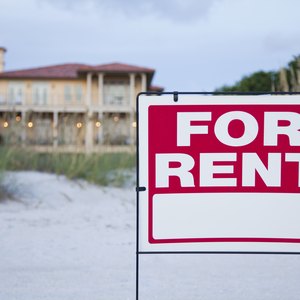
A lease buyout allows a tenant to end a lease contract prior to the conclusion of the lease term without breaking the lease agreement. If such a clause is included in your lease contract, you have the option to buy out the contract by providing notice to your landlord and paying any specified fees rather than completing the full term of the lease contract.
Tips
Typically, individuals can expect to pay at least one month's rent as part of a lease buyout. The specifics of the buyout are left to the contract writer, however.
Lease Buyout Objective
A lease contract is binding on both you and your landlord. If you move out of the property without paying the amount of the full lease contract, your landlord can sue you for unpaid rent obligations. When you execute a lease buyout, your existing lease contract with the landlord becomes null and void.
Understanding Tenant Buyouts
You must notify your landlord within a specific time frame and pay the lease buyout fee, which is usually equivalent to one or more months of rent for the lease term. The lease buyout fee covers the landlord’s loss in connection with an early termination, such as expenses for advertising costs and lost rent payments. You may also be required to obtain approval by the landlord prior to submitting the lease buyout payment. For instance, the lease buyout section in a contract might require you to submit a 30-day notice to terminate the lease as well as pay two months of rent. In return for the landlord’s agreement to terminate the contract, you might also forfeit your right to a refund of the security deposit if that is specified in the lease agreement.
Lease Contract Obligations
A notice to select a lease buyout does not relinquish your obligation to make current or prior rent payments and any associated fees. You must comply with all terms of the lease agreement, such as paying late charges, maintaining renter’s insurance and maintaining the property. If the contract does not require you to revoke your right to a refund of the security deposit, you can request a refund of the security deposit after vacating the property.
Exploring Early Terminations
A lease buyout allows you to shorten the term of your lease for a small fee without being required to pay for the entire lease agreement. If there is no lease buyout clause, you and your landlord can agree to terminate the contract instead with a written termination agreement. The conditions of the termination agreement may require you to pay a termination fee, similar to the terms of a lease buyout. The early termination agreement will also void the original lease contract. However, if you break the lease without an agreement with your landlord, you may be required to pay for the remainder portion of the lease contract or pay monthly rent until the landlord finds a new tenant to occupy the property, whichever comes first.
References
- Legal Zoom: Termination of Lease Agreement and Guide
- DMV: Car Lease Buyout
- Board of Governors of the Federal Reserve System. "Negotiating Terms and Comparing Lease Offers." Accessed July 28, 2020.
- Federal Trade Commission. "Should I Lease a Car?" Accessed July 28, 2020.
- Experian. "State of the Automotive Finance Market," Page 22. Accessed July 28, 2020.
- Kelley Blue Book. "Q: What Is Car Depreciation?" Accessed July 28, 2020.
- Board of Governors of the Federal Reserve System. "Frequently Asked Questions." Accessed July 28, 2020.
Writer Bio
Marie Huntington has been a legal and business writer since 2002 with articles appearing on various websites. She also provides travel-related content online and holds a Juris Doctor from Thomas Cooley Law School.

